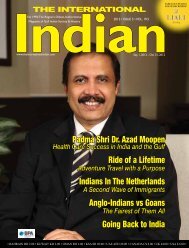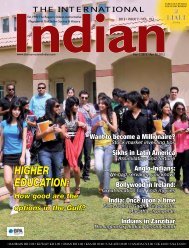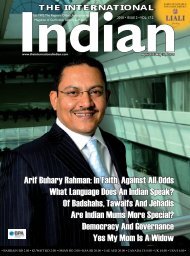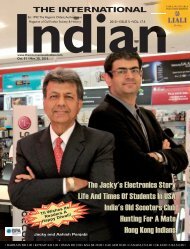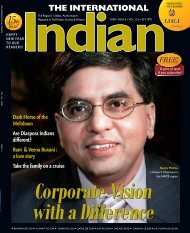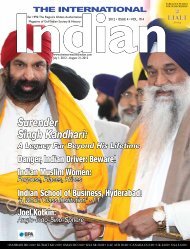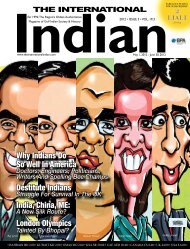THE BUSINESS OF EDUCATION - International Indian
THE BUSINESS OF EDUCATION - International Indian
THE BUSINESS OF EDUCATION - International Indian
You also want an ePaper? Increase the reach of your titles
YUMPU automatically turns print PDFs into web optimized ePapers that Google loves.
[ <strong>THE</strong> INDIA COLUMN ]<br />
Futility of Inquiry Commissions<br />
“How long can the governments fool people by temporarily calming their anger by<br />
setting up commissions, which are nothing more than tokenism?”<br />
[ By VISHAL ARORA ]<br />
It is typical of state governments in<br />
India to set up inquiry commissions<br />
under the Commission of Inquiry<br />
Act of 1952 after incidents of largescale<br />
communal violence. But, is this<br />
exercise fruitful? There are at least<br />
thee reasons why it is not.<br />
One, commissions take too long<br />
in submitting reports and recommendations.<br />
For instance, March<br />
2010 is likely to mark half a century<br />
of the extension of the Justice M.S.<br />
Liberhan Commission, which continues<br />
to probe the 1992 demolition of<br />
the Babri Masjid in Ayodhya (Uttar<br />
Pradesh). On September 30, its term<br />
was extended for the 47th time by six<br />
more months.<br />
The Liberhan Commission was set<br />
up by the then P.V. Narasimha Rao government<br />
10 days after the demolition of the<br />
mosque on Dec 6, 1992. The order setting<br />
up the commission stipulated that it complete<br />
the inquiry “as soon as possible but not<br />
later than three months”. Regrettably, the<br />
three months’ deadline has been stretched<br />
to 16 long years.<br />
One fails to understand how an inquiry<br />
panel can investigate a crime months or years<br />
after its occurrence? It is simple logic that<br />
the longer one waits, the lesser the chances<br />
of gathering evidence against the perpetrators.<br />
But, the fact that the Liberhan Commission<br />
has recorded statements of several<br />
senior BJP leaders, including L.K. Advani,<br />
Murli Manohar Joshi and Uma Bharati, and<br />
former Uttar Pradesh chief minister Kalyan<br />
Singh, suggests why there is such a delay.<br />
Two, the independence and neutrality<br />
of commissions are questionable. For<br />
example, five days before the term of the<br />
Liberhan Commission was extended, the<br />
first part of the Nanavati Commission report<br />
was tabled in the Gujarat state assembly.<br />
The report said the burning of the S-6<br />
coach of the Sabarmati Express train on<br />
February 27, 2002 near the Godhra railway<br />
station was an act of some local Muslims.<br />
It also absolved the Bharatiya Janata Party<br />
(BJP) government, which was believed to<br />
be behind the gory anti-Muslim violence<br />
that ensued. In other words, the report stated<br />
exactly what Chief Minister Narendra<br />
Modi wanted to hear and advertise on the<br />
eve of general elections.<br />
The Nanavati Commission report, which<br />
gave a clean chit to the chief minister<br />
who was called a modern day Nero by the<br />
Supreme Court of India for failing to protect<br />
the lives of Muslims, contradicted the report<br />
of a committee set up by the railway ministry<br />
under the leadership of Lalu Prasad Yadav<br />
and headed by former judge U.C. Banerjee.<br />
In its interim report submitted in January<br />
2005, the Banerjee Committee stated the<br />
train fire was an accident and that there was<br />
no evidence to suggest that it was planned.<br />
Besides, numerous independent inquiry reports<br />
held the Modi government guilty of<br />
allowing extreme Hindu nationalist groups<br />
to perpetrate violence on Muslims with almost<br />
total impunity.<br />
The Nanavati Commission report<br />
dismayed the minority Muslim<br />
community in India, but there<br />
was nothing surprising about it. For,<br />
the Commission, which was set up<br />
by the Modi government in March<br />
2002, comprised of two justices,<br />
G.T. Nanavati and K.G. Shah. Justice<br />
Shah expired earlier this year,<br />
and the government appointed in his<br />
place former judge Akshay Mehta,<br />
who is believed to be close to Modi.<br />
The appointment of Justice Mehta<br />
and the time of the submission of the<br />
report that was still incomplete raise<br />
doubts in the minds of people about<br />
its neutrality.<br />
Lastly, the findings and recommendations<br />
of inquiry commissions<br />
are not binding. Take for example<br />
the Justice Srikrishna Commission,<br />
which in 1998 clearly indicted the Shiv Sena<br />
in the infamous incident of communal violence<br />
against Muslims in Mumbai in 1992-<br />
93. It made several recommendations, but<br />
they have neither been accepted nor acted<br />
upon by any Maharashtra government since<br />
then. This, despite loud hues and cries being<br />
raised by numerous non-governmental<br />
organisations.<br />
If commissions take years to come up<br />
with findings, if they are not shielded from<br />
a possible influence of ruling governments,<br />
and if their recommendations are not binding,<br />
who needs commissions of inquiry?<br />
How long can the governments fool people<br />
by temporarily calming their anger by setting<br />
up commissions, which are nothing<br />
more than tokenism? Two years ago, the<br />
Supreme Court rightly observed that commissions<br />
were appointed for only mere<br />
political reasons “knowing fully well that<br />
nothing will come out of it”.<br />
Vishal Arora is a freelance journalist<br />
based in New Delhi.<br />
8<br />
<strong>THE</strong> INTERNATIONAL INDIAN



